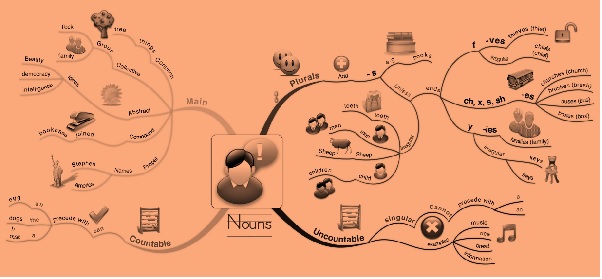
|
Common Noun |
Proper Noun |
|
President |
Narendra Modi |
|
Teacher |
Mrs. Williams |
Nominalization
From Adjectives to Nouns
From Verbs to Nouns

Countable Nouns
Examples –
Examples-
Q.1 |
In each of the following sentences, the first sentence is fancy due to heavy nominalisation while the second sentence needs a strong verb to replace the empty verbs resulting from nominalisations. Fill in the gaps. There was considerable confusion of the laws from the case. The case _______________ the laws considerably. |
| a) | Confused |
| b) | Considered |
| c) | Confusion |
| d) | none of the above |
Q.2 |
Select the nouns that should be changed to verbs in the following sentences. An application to defer sitting a Class test must be submitted within three working days of the test. |
| a) | Test |
| b) | Working |
| c) | Defer |
| d) | Application |
Q.3 |
Select the nouns that should be changed to verbs in the following sentences. Upon your arrival at the hotel, notify the receptionist. |
| a) | Notify |
| b) | Arrival |
| c) | Hotel |
| d) | none of the above |
Q.4 |
Select the nouns that should be changed to verbs in the following sentences. Patient complaints were about the hospital’s cleanliness. |
| a) | Patient |
| b) | Cleanliness |
| c) | Complaints |
| d) | none of the above |
Q.5 |
Select the nouns that should be changed to verbs in the following sentences. Make your payment online via the portal. |
| a) | Online |
| b) | Payment |
| c) | Both a and b |
| d) | none of the above |
Q.6 |
Select the nouns that should be changed to verbs in the following sentences. Approval is only given for projects that will have minimal impact on biodiversity values. |
| a) | Impact |
| b) | Biodiversity |
| c) | Projects |
| d) | Approval |
Q.7 |
Combine the following sentences by changing the adjective to a noun. Choose the option that has pairs NOT representing nominalisation of adjectives. |
| a) | decorate-decoration; divide-division |
| b) | confident-confidence; different-difference |
| c) | kind-kindness; selfish-selfishness |
| d) | none of the above |
Q.8 |
Combine the following sentences by changing the adjective to a noun. Choose the option that has pairs NOT representing nominalisation of adjectives. |
| a) | enthusiastic-enthusiasm; expert-expertise |
| b) | intend-intention; improve-improvement |
| c) | Formal-formality; original-originality |
| d) | Thirsty-thirst; guilty-guilt |
Q.9 |
Combine the following sentences by changing the adjective to a noun. Choose the option that has pairs NOT representing nominalisation of adjectives. |
| a) | attractive-attractiveness; nervous-nervousness |
| b) | bored-boredom; high-height |
| c) | strong-strength; deep-depth |
| d) | preserve-preservation; interrupt-interruption |
Q.10 |
Combine the following sentences by changing the adjective to a noun. Choose the option that has pairs NOT representing nominalisation of adjectives. |
| a) | expand-expansion; entertain-entertainment |
| b) | generous-generosity; sensitive-sensitivity |
| c) | broad-breadth; warm-warmth |
| d) | none of the above |
Your Score: 0/10
Yearlong program for Olympiads preparation & to build necessary skills for future.
Explore More
Time to mark your calendar with the upcoming Olympiads exam schedule.
Explore More
Take your Olympiad preparation to next-level by taking LIVE Classes.
Explore More
Assess your performance by taking topic-wise and full length mock tests.
Explore More
Online tuitions for international compeitions like SASMO, SEAMO, etc for Grades 1-11.
Explore More